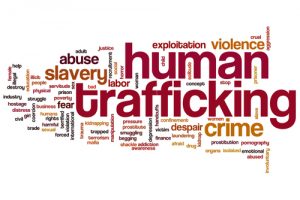
January is National Slavery and Human Trafficking Prevention Month. In honor of the millions who become victims of this evil, the following is a fact sheet on Human Trafficking and Slavery to debunk some of the myths that circulate.
- MYTH: Human trafficking is a global problem. There is nothing I can do to help.
FACT: Human trafficking has been reported in every single state in the U.S. Know the signs and look beneath the surface when interacting with people in your community. Call the National Human Trafficking Hotline at 888-373-7888 to report tips or to learn more about how you can help your community.
- MYTH: Trafficking includes some form of travel or transportation across borders.
FACT: Human trafficking does not require movement or border crossing. If someone is forced to work or engage in commercial sex against their will, it is trafficking.
- MYTH: Victims must be held against their will using some form of physical restraint or bondage.
FACT: While some traffickers physically hold the people they exploit, it is more common for them to use psychological means of control. Fear, trauma, drug addiction, threats against families, and a lack of options due to poverty and homelessness can all prevent someone from leaving. Some individuals experiencing trafficking may also be manipulated or believe they are in love with their trafficker, which can make them resistant to seeking help.
Some traffickers use more subtle methods of trapping and controlling people, such as:
- Isolating them from family, friends, and the public by limiting contact with outsiders and making sure that any contact is monitored
- Confiscating passports or other identification documents
- Threatening to shame them by exposing humiliating circumstances to their families
- Threatening imprisonment or deportation if they contact authorities
- Debt bondage through enormous financial obligations or an undefined or increasing debt
- Controlling their money
- MYTH: Victims will be desperate to escape their trafficker and ask for help when they need it.
FACT: Individuals who experience trafficking may not readily seek help due to a number of factors, including shame, self-blame, fear, or even specific instructions from their traffickers regarding how to behave when interacting with others. They do not always self-identify and may not realize that they have rights.
OTIP encourages social services and law enforcement to take time to look beneath the surface and build trust with individuals who may be experiencing trafficking before making judgments about their situation.
- MYTH: If someone is paid or consented to be in their initial situation, it’s not trafficking.
FACT: Initial consent to commercial sex or labor before the trafficker used force, fraud, or coercion is not relevant.
- MYTH: Human trafficking is the same as smuggling.
FACT: Human smuggling and human trafficking are distinct crimes under federal law.
Human smuggling refers to an illegal border crossing, while human trafficking involves commercial sex acts or labor/services that are induced through force, fraud, or coercion, regardless of whether or not transportation occurs.
- MYTH: Human trafficking is the same thing as sex trafficking.
FACT: Human trafficking also includes labor trafficking, which involves children and adults compelled to perform labor or services by force, fraud, or coercion.
- MYTH: Only women and children are trafficked.
FACT: Anyone can experience human trafficking, including men. Traffickers prey on the vulnerable, often with promises of a better life. Risk factors for trafficking include: prior history of abuse or sexual violence, generational trauma, poverty, unemployment, and unstable living situations, or homelessness.
*Facts and Myths taken from Administration for Children and Families website; a division of the Department of Health and Human Services.
~Cynthia Morris
